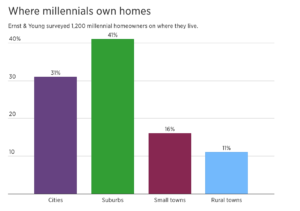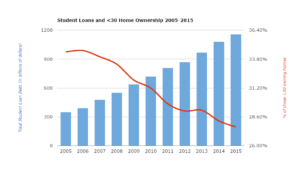It looks like millennials have abandoned their big-city dreams—more people aged 20-36 are living in the suburbs than in the city.
Millennials have the reputation of not being very responsible with their money—some say that they can’t afford to buy homes because they spend their paychecks on avocado toast. But living in the suburbs? Isn’t that the American dream?
Rent or own, 38% of millennials live in the suburbs compared to 37% that live in the city. Though this is only a difference of one percentage point, it marks a turning point for this generation. Moreover, for millennial homeowners, 41% decided to stick to the suburbs rather than anywhere else, compared to 36% in 2016.
For some, the suburbs represent settling down, starting a family, and overall stability. However, at face value, suburbs are an affordable living option for those who want an easy commute to the city for other reasons. If millennials really do value things like avocado toast, good Instagram posts, and trendy brunches, moving right outside of expensive big cities might just be the smart thing to do to keep up their habits.
One thing that could be holding millennials back from affording the city lifestyle they might crave is student debt. 83% of people 22-35 who have student debt and do not own homes claim the two are correlated.
Though millennials have been buying more homes lately, around 70% of those who have regret it. One reason is the hefty down payment—a survey found that a third of them dipped into their retirement savings. Other reasons include underestimating ongoing costs and buying a home even when timing wasn’t perfect.
Given the buyer’s remorse, it makes sense why millennials are gravitating to the suburbs. A report by Zillow shows that people can spend around 26.5% of their income to own property in a city, but only 20.2% to own a similar home in the suburbs.
The move to the suburbs could mean that millennials are changing their reputation. A 2016 survey by Ernst & Young LLP and Economic Innovation Group (EIG) showed that the age group was “deeply pessimistic.” Two years later, that picture has changed. They’re getting married sooner than they thought they would, they’re graduating college and entering the workforce with stable jobs, and they think the economy is doing well. Most millennials think that sticking with one company is the best way to advance in their careers instead of hopping from place to place.
Though there are countless theories about the reason behind it, this newfound attitude is likely the result of growing up. Millennials live and learn, too.


Leave a Reply
You must be logged in to post a comment.